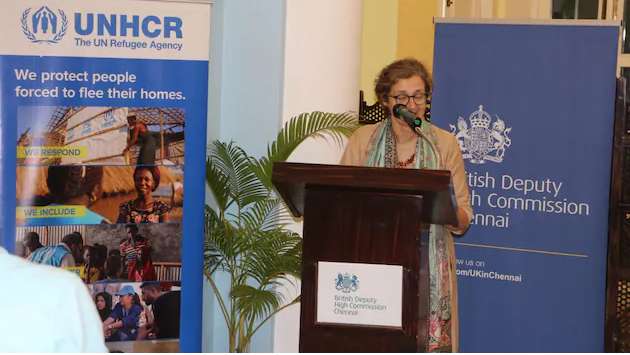November 10, Colombo (LNW): The United Nations Refugee Agency (UNHCR) is holding discussions with its Colombo mission to resume the voluntary repatriation of Sri Lankan refugees living in India, following the suspension of the programme after the recent arrest of four returnees in Sri Lanka.
Speaking to NDTV, Areti Sienni, UNHCR’s Chief of Mission in India, described the arrests as “concerning” and said the agency was hopeful that the process could soon restart. She revealed that around 200 Sri Lankans returned home last year under the voluntary repatriation scheme, with about 50 more expressing interest in returning this year.
Sienni emphasised that the UNHCR continues to work alongside Indian authorities to secure long-term solutions for refugees — whether through repatriation, naturalisation, or third-country resettlement. India currently hosts over 80,000 Sri Lankan refugees, most of whom fled the island during its civil conflict and have since lived in Tamil Nadu, with some families spanning three generations.
Since the launch of the voluntary repatriation programme in 2002, more than 18,600 refugees have returned to Sri Lanka with UNHCR support. However, for many others born and raised in India, the lack of formal refugee legislation remains a major obstacle. Without citizenship, they continue to reside in designated refugee camps monitored by local authorities, facing restrictions on employment, education, and mobility.
While the younger generation has gained access to higher education, they often encounter barriers in entering professional fields such as medicine and public service, as employers are hesitant to recruit non-citizens. Many young refugees now consider India their permanent home and express little interest in returning to Sri Lanka.
Under Indian law, Sri Lankan refugees are not penalised for overstaying, but they are still legally classified as “illegal migrants” under the Citizenship Act. Moreover, the Citizenship Amendment Act — which fast-tracks naturalisation for non-Muslim migrants from Pakistan, Afghanistan, and Bangladesh — does not extend the same benefits to Sri Lankan nationals.
Amid this legal ambiguity, the Tamil Nadu government has introduced several measures to uplift refugee communities, including vocational training, financial assistance for women-led enterprises, and partnerships with industries to employ skilled youth, particularly in the IT sector.
Sienni acknowledged that the decision to grant citizenship ultimately rests with the Indian government, but praised Tamil Nadu’s initiatives and its collaboration with legal experts and civil society to help eligible refugees secure legal status. The UNHCR, she said, continues to offer technical and policy support to both central and state authorities to promote refugee inclusion.
“Citizenship is a powerful expression of belonging,” Sienni remarked. “When it becomes accessible, it marks the end of refugeehood and opens the door to full participation in a nation’s social and economic life.”
She commended the Indian and Tamil Nadu governments’ ongoing efforts, calling them “a valuable example for the international community” in promoting dignity, stability, and opportunity for long-term refugee populations.
